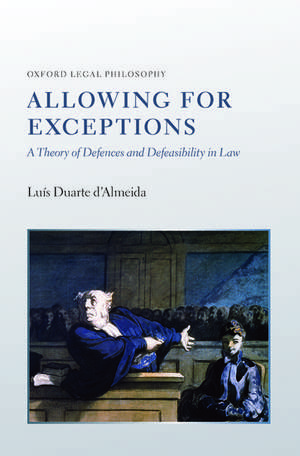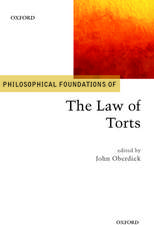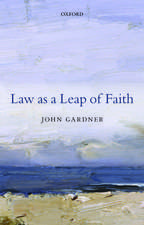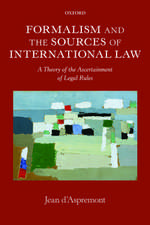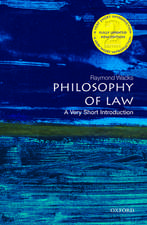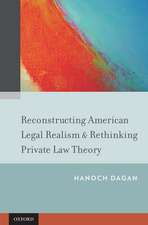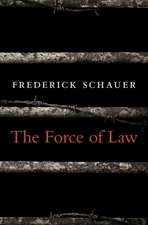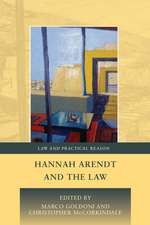Allowing for Exceptions: A Theory of Defences and Defeasibility in Law: Oxford Legal Philosophy
Autor Luís Duarte d'Almeidaen Limba Engleză Hardback – 26 mar 2015
Preț: 600.06 lei
Preț vechi: 859.53 lei
-30% Nou
Puncte Express: 900
Preț estimativ în valută:
114.86€ • 124.80$ • 96.54£
114.86€ • 124.80$ • 96.54£
Carte tipărită la comandă
Livrare economică 10-16 aprilie
Preluare comenzi: 021 569.72.76
Specificații
ISBN-13: 9780199685783
ISBN-10: 0199685789
Pagini: 308
Dimensiuni: 164 x 241 x 23 mm
Greutate: 0.61 kg
Editura: OUP OXFORD
Colecția OUP Oxford
Seria Oxford Legal Philosophy
Locul publicării:Oxford, United Kingdom
ISBN-10: 0199685789
Pagini: 308
Dimensiuni: 164 x 241 x 23 mm
Greutate: 0.61 kg
Editura: OUP OXFORD
Colecția OUP Oxford
Seria Oxford Legal Philosophy
Locul publicării:Oxford, United Kingdom
Recenzii
Rigorously argued, erudite and persuasive. . . An immensely impressive piece of legal and philosophical scholarship.
Tightly argued and highly valuable...In explaining the intersection of defenses, defeaters, and exceptions in criminal law, in law generally, and for rules generally by use of the idea of the burden of proof, [Duarte] d'Almeida has not only offered a more than plausible solution to the problem he has set out to solve, and has not only done so with admirable rigor, but has also made a substantial contribution to the literature on rules more generally...Deserves to be read and absorbed by anyone interested in deontic logic, artificial intelligence, the operation of legal (and other) rules, and the characteristics of normative systems generally, whether those be the normative systems of law, of games, of etiquette, or even of morality.
[A]n extraordinary achievement. The depth of research is remarkable: work on defeasibility from a number of disciplines (and from literature in numerous languages) is examined, but never does the book descend to literature review. There are interesting contributions to many topics, including burdens of proof, the concept of action and criminal law theory. The writing is crisp, the arguments clear. Although the conclusions are striking and at times controversial, their controversy is not hidden and the flaws of rival views are carefully explained. In many respects, it is a model of scholarship. It deserves to be widely read not only by philosophers of action and law, but also any lawyer who thinks seriously about defences.
Tightly argued and highly valuable...In explaining the intersection of defenses, defeaters, and exceptions in criminal law, in law generally, and for rules generally by use of the idea of the burden of proof, [Duarte] d'Almeida has not only offered a more than plausible solution to the problem he has set out to solve, and has not only done so with admirable rigor, but has also made a substantial contribution to the literature on rules more generally...Deserves to be read and absorbed by anyone interested in deontic logic, artificial intelligence, the operation of legal (and other) rules, and the characteristics of normative systems generally, whether those be the normative systems of law, of games, of etiquette, or even of morality.
[A]n extraordinary achievement. The depth of research is remarkable: work on defeasibility from a number of disciplines (and from literature in numerous languages) is examined, but never does the book descend to literature review. There are interesting contributions to many topics, including burdens of proof, the concept of action and criminal law theory. The writing is crisp, the arguments clear. Although the conclusions are striking and at times controversial, their controversy is not hidden and the flaws of rival views are carefully explained. In many respects, it is a model of scholarship. It deserves to be widely read not only by philosophers of action and law, but also any lawyer who thinks seriously about defences.
Notă biografică
Luís Duarte d'Almeida is Chancellor's Fellow in Law at the University of Edinburgh. He was educated at Lisbon (BA, LLM) and at Oxford (DPhil), and prior to his appointment at Edinburgh he was Junior Research Fellow of Churchill College, Cambridge, and Research Fellow in Legal Philosophy at the University of Girona, Spain. His research is in general jurisprudence, the philosophical foundations of criminal law, and legal reasoning and argumentation.
